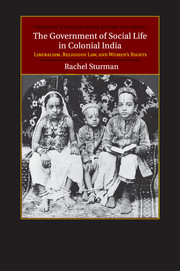Crossref Citations
This Book has been
cited by the following publications. This list is generated based on data provided by Crossref.
Hale, Matthew
Raymond, Graham
and
Wright, Catherine
2013.
List of publications on the economic and social history ofGreatBritain andIreland published in 2012.
The Economic History Review,
Vol. 66,
Issue. 4,
p.
1134.
2013.
BOOKS RECEIVED FOR REVIEW.
Bulletin of the School of Oriental and African Studies,
Vol. 76,
Issue. 1,
p.
201.
2014.
Given to the Goddess.
p.
1.
2014.
Given to the Goddess.
p.
113.
2014.
Given to the Goddess.
p.
39.
2014.
Given to the Goddess.
p.
223.
Stephens, Julia
2014.
An Uncertain Inheritance: The Imperial Travels of Legal Migrants, from British India to Ottoman Iraq.
Law and History Review,
Vol. 32,
Issue. 4,
p.
749.
Koya, Riyad Sadiq
2014.
The Campaign for Islamic Law in Fiji: Comparison, Codification, Application.
Law and History Review,
Vol. 32,
Issue. 4,
p.
853.
2014.
Given to the Goddess.
p.
251.
2014.
Given to the Goddess.
p.
181.
2014.
Given to the Goddess.
p.
71.
Pant, Rashmi
2014.
Matrimonial strategies among peasant women in early 20th century Garhwal.
Contributions to Indian Sociology,
Vol. 48,
Issue. 3,
p.
357.
2014.
Given to the Goddess.
p.
142.
Denault, Leigh
2014.
The Home and the World: New Directions in the History of the Family in South Asia.
History Compass,
Vol. 12,
Issue. 2,
p.
101.
2014.
Given to the Goddess.
p.
213.
Sharafi, Mitra
2015.
South Asian Legal History.
Annual Review of Law and Social Science,
Vol. 11,
Issue. 1,
p.
309.
Donner, Henrike
2015.
‘Daughters are Just Like Sons Now’.
Journal of South Asian Development,
Vol. 10,
Issue. 3,
p.
318.
Yahaya, Nurfadzilah
2015.
The Question Of Animal Slaughter In The British Straits Settlements During The Early Twentieth Century.
Indonesia and the Malay World,
Vol. 43,
Issue. 126,
p.
173.
Stevens, John
2016.
Marriage, duty and civilization: Keshab Chandra Sen and the Cuch Bihar controversy in metropolitan and colonial context.
South Asian History and Culture,
Vol. 7,
Issue. 4,
p.
401.
DONNER, HENRIKE
and
SANTOS, GONÇALO
2016.
Love, Marriage, and Intimate Citizenship in Contemporary China and India: An introduction.
Modern Asian Studies,
Vol. 50,
Issue. 4,
p.
1123.



